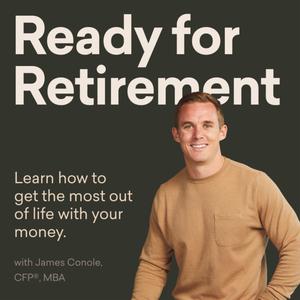
Ready For Retirement
James Conole, CFP®
Ready For Retirement is the podcast dedicated to helping you learn the tips and strategies that will help you achieve your retirement goals. When it comes to retirement planning, it can quickly become overwhelming and easy to not take action. I designed this podcast because I want you to have the knowledge and confidence to create your secure retirement. My ultimate goal for all of my clients (and listeners) is to create peace of mind and that starts with having a strategy. I want you to spend more time thinking about what matters most to you in retirement. I post weekly episodes to keep you up-to-date on all the best tips and strategies to create a retirement that excites you. Everything from investing tips, tax planning, withdrawal strategies, insurance planning, Social Security, and that's just the start! Let's help you maximize your return on life. We use your money and the strategies I share in this podcast to do just that!
- 21 minutes 19 seconds3 Simple Steps to Determine If You Can Retire
How do you know if you can retire? It seems straightforward, but the answer is far from simple. Beyond portfolio balances and age thresholds, there are other things to consider. James explains his three-step test to determine your retirement readiness.
By pulling together principles from the 4% Rule, straight-line projection, and a Monte Carlo analysis, you can assess whether your portfolio can sustain your desired lifestyle over decades amid various market conditions. However, these tests alone don’t paint the complete picture. James emphasizes the importance of considering other assets like potential inheritances or property downsizing to more fully and confidently evaluate when you can retire.
Questions Answered:
How can I determine if I’m financially ready to retire?
Is the 4% Rule sufficient for determining retirement readiness?
Timestamps:
0:00 - Consider withdrawal rate
2:14 - 4% Rule
5:12 - Not a perfect strategy
7:39 - Straight line projection
9:09 - Downside of SL projection
11:07 - Monte Carlo test
13:07 - Understand severity of failure
16:20 - Defining success,
18:25 - Looking aheadCreate Your Custom Strategy ⬇️
30 April 2024, 10:00 am - 21 minutes 54 secondsTax Planning for Widowed Retirees: How to Optimize Your Tax Strategy
Jennifer, 54, plans to retire soon. Her husband, 70, is retired, on Social Security, and dealing with some severe health issues. Jennifer worries about possibly becoming single in retirement, which could result in a higher tax bracket for her.
Jennifer is considering whether to convert her traditional accounts to Roth to lower future taxes or to change her contributions to Roth 403b, even if it means paying more taxes now. James walks us through several factors for her to consider and demonstrates why her future tax situation is likely not as dire as she thinks.
Questions Answered:
How should Jennifer maximize her retirement savings in light of her current financial situation and future tax implications?
What factors must Jennifer consider when deciding whether to convert her traditional retirement accounts to Roth or change her contributions to Roth 403b?
Timestamps:
0:00 - Jennifer’s question
4:46 - Retire early for tax benefits?
6:05 - Roth conversion strategy
8:43 - Consider future expenses
12:38 - Assess SS strategies
13:56 - Consider living situation
15:54 - The conversion question
17:54 - Main takeawaysCreate Your Custom Strategy ⬇️
23 April 2024, 10:00 am - 17 minutes 43 secondsLump Sum vs. Annuitization: Tax Implications for Your Non-Qualified Annuity
Joe is planning for retirement and wants to minimize his tax burden, especially on the interest earned from his three annuities. James explains that non-qualified annuities are purchased with post-tax money and offer tax deferral on growth until withdrawal. When taking out funds, the principal is tax-free, but earnings are taxed at ordinary income rates.
He explores strategies for tax-efficient withdrawals. He also touches on annuities, options like a 1035 exchange to transfer an annuity into a different product for improved performance, the tax implications for heirs, and early withdrawal penalties before age 59 and a half.
Questions Answered:
How are non-qualified annuities taxed upon distribution, including both lump sum and annuity options?
What strategies can be implemented to keep the tax burden as low as possible when withdrawing from non-qualified annuities?
Timestamps:
0:00 - Joe’s question
1:52 - Non-qualified annuity overview
5:11 - Potential tax strategies
10:02 - Annuitization option
12:31 - Annuity regret
13:22 - 1035 Exchange
14:33 - Things to knowCreate Your Custom Strategy ⬇️
16 April 2024, 10:00 am - 24 minutes 2 secondsAt What Age Should I Work with a Financial Advisor?
Deciding to work with a financial advisor is about more than how much you've stashed away. It's also about determining whether an advisor's benefits outweigh the costs.
In your higher earning years, finances become more complex. More money means more decisions and more chances to make mistakes or miss out on opportunities. That's where a quality advisor can come in handy. They help you steer clear of bad investments, seize the right opportunities, and keep financial stress at bay.
Having more than one perspective to draw from is the key to well-informed financial decisions. Teaming up and talking it out, whether with your partner or a financial advisor, is always beneficial.
Questions answered:
How can I determine whether working with a financial advisor is worth it for me?
What factors should I consider when deciding if I need a financial advisor beyond just my age or income level?
Timestamps:
0:00 - Not an age-related decision
2:43 - Value and pricing structure
4:12 - Natural conflicts
7:24 - When benefit exceeds cost
10:02 - Cost of mistakes
12:18 - Cost of missed opportunities
14:16 - Cost of anxiety
16:02 - Thought partnership
21:36 - SummaryCreate Your Custom Strategy ⬇️
9 April 2024, 10:00 am - 24 minutes 48 secondsSell, Rent, or Borrow? Best Ways to Use Home Equity in Retirement
Listener Ray is wondering what to do with his home as he embarks on a nomadic, van-life journey in retirement. Should he sell it to finance his travels or retain it for potential appreciation and cash flow?
James explores the nuances of home ownership as an asset versus an investment. He considers cash flow and leverage as he looks at Ray’s three options – sell, rent, or borrow – while emphasizing aligning financial decisions with personal goals and aspirations.
Questions Answered:
Why shouldn’t I consider my home an investment?
What are the key financial considerations for retirees when deciding whether to sell, rent them out, or explore other options?
Timestamps:
0:00 - Ray’s question
1:56 - Why a home isn’t an investment
4:38 - Do you want to be a landlord?
8:22 - The financials
10:14 - Asset appreciation
11:30 - Cashflow
15:04 - Leverage
19:02 - What should Ray do?
20:33 - Reverse mortgageCreate Your Custom Strategy ⬇️
2 April 2024, 10:00 am - 34 minutes 55 secondsPay ZERO Capital Gains Tax vs Roth Conversions in Retirement: How to Determine Which is Best
Listener Drew asks about a tax strategy for juggling capital gains and Roth conversions. While it can be a complicated question – especially when large accounts are involved – James provides some general guidelines that can be helpful for anyone with similar gnarly tax strategy challenges in retirement.
In this episode, we’ll cover the extent to which required distributions will be an issue, what you need to alleviate that issue, and the timeframe within which you have to do that.
James explains how to work backward to project your various tax brackets and determine how to prioritize tax gain harvesting, Roth conversions, and other tax strategies.
Questions Answered:
What is tax gain harvesting?
What is the tax planning window and how do I use it to my advantage?
Timestamps:
0:00 - Drew’s question
2:50 - Determine use for each asset
5:59 - Tax gain harvesting
11:10 - Back to Drew
15:30 - James’ priorities for Drew
18:41 - Usually not either/or
20:07 - Working backwards
24:50 - General principles
29:50 - Tax planning window
32:16 - SummaryCreate Your Custom Strategy ⬇️
26 March 2024, 10:00 am - 28 minutes 25 secondsTax-Smart Strategies for Wealth Transfer: Secure Your Family's Future
James responds to listener Jerry’s question about the optimal time to distribute inheritance or charitable gifts: before or after passing away.
James walks listeners through four important things to consider when it comes to gifting and inheritance: your gifting goal, whether you have a strong desire to see the assets gifted within your lifetime, the tax implications of various types of gifts, and what to do with assets you plan to retain for now but are intended for future generations.
Questions Answered:
Should I give my children and grandchildren their inheritance before or after I die?
What are the tax implications to my children when I gift them my assets?
Timestamps:
0:00 - Jerry’s question
2:20 - What is your gifting goal?
3:38 - Gift during your lifetime?
6:51 - Timing and priorities
9:17 - Different tax implications
12:08 - Exemption amounts
14:13 - Tax implications to child
15:33 - Proper beneficiary designations
21:41 - The right time horizon
24:45 - SummaryCreate Your Custom Strategy ⬇️
19 March 2024, 10:00 am - 35 minutes 14 secondsRoth Conversion Strategies to Protect Your Spouse's Future Tax Burden
A listener says, “Eventually, one spouse will pass before the other, which will often catapult the survivor into a significantly higher tax bracket. Shouldn’t a Roth strategy take this into account?”
James explores several factors that could positively and negatively impact a survivor’s tax liability and what to consider when creating a Roth conversion strategy.
Questions Answered:
How can Roth conversions benefit married couples beyond tax savings?
What factors should be considered when determining the optimal strategy for Roth conversions to protect a surviving spouse?
Timestamps:
0:00 - Steve’s question
3:40 - An example
6:41 - 3 changes
12:32 - Positive impacts
15:22 - RMD calculations
16:45 - Widows tax penalty
19:46 - When to do Roth conversions
23:40 - Big age gap
28:45 - Start with a good reason
29:57 - The bottom lineCreate Your Custom Strategy ⬇️
12 March 2024, 10:00 am - 19 minutes 17 secondsShould I Fund my Retirement Needs by Purchasing an Annuity?
Jason and his wife face a crucial decision: whether to purchase an annuity or pursue traditional investments as they prepare for a full-time, slow-travel retirement.
With a diverse array of income sources, including pensions, 401k, property sales, and Social Security, they estimate their monthly expenses at $7,500. James analyzes their situation, emphasizing the balance between annuity stability and investment flexibility.
He highlights the security of annuities and explains their limitations, guiding the couple towards a tailored approach that aligns with their goals and circumstances.
Questions Answered:
What are the pros and cons of annuities?
How can I effectively balance the stability of annuities with the flexibility of traditional investments?
Timestamps:
0:00 - Jason’s question
3:07 - Pros and cons of annuities
6:32 - Assessing Jason’s situation
9:52 - The role of Jason’s portfolio
11:40 - Annuity alternatives
13:23 - Support your retirement vision
16:54 - Integrate financial plan and portfolioCreate Your Custom Strategy ⬇️
5 March 2024, 11:00 am - 26 minutes 1 secondHow Should I Invest Bucket #1 of my Retirement Portfolio (3 Bucket Strategy)
The "Three Bucket Strategy" is a popular retirement income planning method. The first bucket covers immediate expenses in retirement. Listeners John and Donna are seeking advice on constructing their first bucket. With $1.6 million in assets and pension incomes, they aim to retire in 2026.
James analyzes their needs, income sources, and portfolio and lays a foundation for their Bucket #1. It's crucial to bridge the gap between expenses and income, considering risk capacity and tolerance.
Questions Answered:
How do you divide assets into the three buckets, and what is the purpose of each?
What role do risk capacity and risk tolerance play in determining portfolio allocation?
Timestamps:
0:00 - John and Donna
3:36 - The bucket approach
5:50 - Start with expenses
8:53 - Non-portfolio income sources
11:23 - Identify and bridge the gap
13:06 - Assessing their portfolio
14:53 - Portfolio dividend yield
16:49 - Do you need Bucket 1?
19:16 - What is the specific need?
21:07 - Risk capacity
23:22 - Test contingenciesCreate Your Custom Strategy ⬇️
27 February 2024, 11:00 am - 31 minutes 7 secondsAt What Point Should I Take the Tax Hit on Unrealized Gains?
Benjamin, nearing retirement at 65, faces a familiar dilemma with his taxable account housing expensive mutual funds. Despite their underperformance, converting to low-cost index funds entails a significant tax hit due to long-held appreciable value.
James explains weighing the immediate tax consequences against the risk of holding onto underperforming assets. He also provides a framework for assessing risk, identifying options, and making decisions based on personal financial goals.
Questions Answered:
How can you decide whether to sell underperforming mutual funds or continue holding onto them?
What factors should you consider in determining whether converting to low-cost index funds aligns with your financial goals and risk tolerance?
Timestamps:
0:00 - Listener question from Benjamin
2:17 - Tail wagging dog?
3:52 - Benjamin’s situation
5:31 - WCS of selling vs not selling
11:17 - Be careful about tax drag
12:47 - Rethinking the break-even point
14:11 - Consider your goal for the money
17:17 - Identify the bigger risk
19:26 - Make your decision
20:26 - Will your tax situation change?
24:20 - Consider staggering sales
28:21 - SummaryCreate Your Custom Strategy ⬇️
20 February 2024, 11:00 am - More Episodes? Get the App
Your feedback is valuable to us. Should you encounter any bugs, glitches, lack of functionality or other problems, please email us on [email protected] or join Moon.FM Telegram Group where you can talk directly to the dev team who are happy to answer any queries.
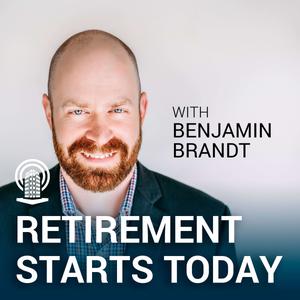 Retirement Starts Today Radio
Retirement Starts Today Radio
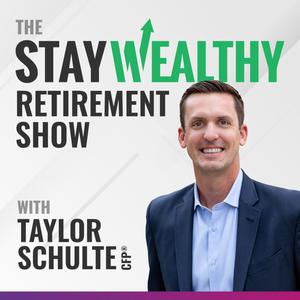 Stay Wealthy Retirement Show
Stay Wealthy Retirement Show
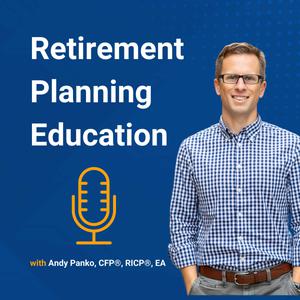 Retirement Planning Education, with Andy Panko
Retirement Planning Education, with Andy Panko
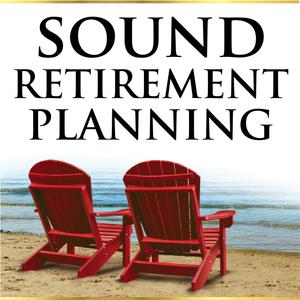 Sound Retirement Radio
Sound Retirement Radio
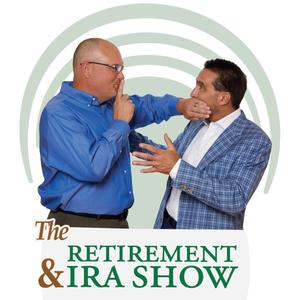 The Retirement and IRA Show
The Retirement and IRA Show
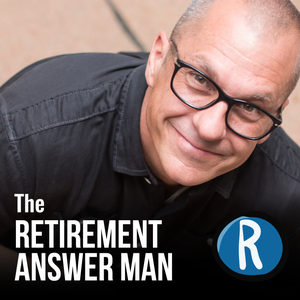 Retirement Answer Man
Retirement Answer Man